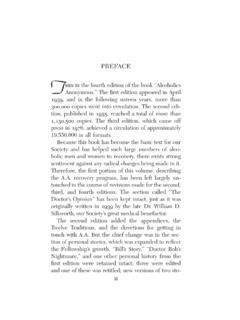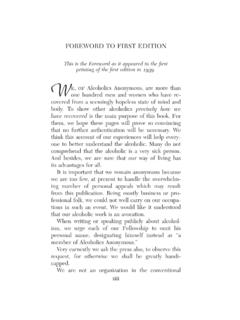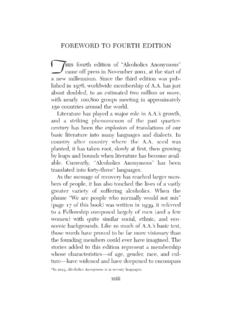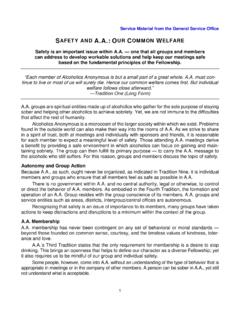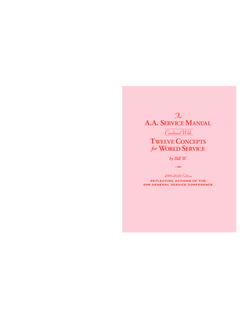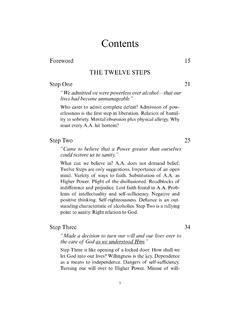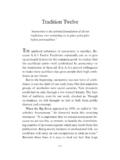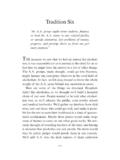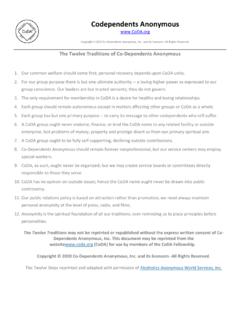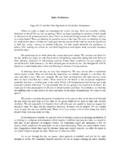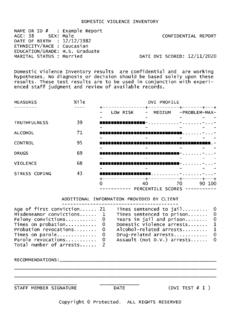Transcription of Twelve Steps - Step Seven - (pp. 70-76) - Alcoholics …
1 70 step Seven Humbly asked Him to remove our shortcom-ings. SINCE this step so specifi cally concerns itself with hu-mility, we should pause here to consider what humility is and what the practice of it can mean to , the attainment of greater humility is the founda-tion principle of each of s Twelve Steps . For without some degree of humility, no alcoholic can stay sober at all. Nearly all s have found, too, that unless they develop much more of this precious quality than may be required just for sobriety, they still haven t much chance of becom-ing truly happy. Without it, they cannot live to much useful purpose, or, in adversity, be able to summon the faith that can meet any , as a word and as an ideal, has a very bad time of it in our world.
2 Not only is the idea misunderstood; the word itself is often intensely disliked. Many people haven t even a nodding acquaintance with humility as a way of life. Much of the everyday talk we hear, and a great deal of what we read, highlights man s pride in his own great intelligence, men of science have been forcing nature to disclose her secrets. The immense resources now being harnessed promise such a quantity of material bless-ings that many have come to believe that a man-made mil-lennium lies just ahead. Poverty will disappear, and there step SEVEN71will be such abundance that everybody can have all the security and personal satisfactions he desires. The theory seems to be that once everybody s primary instincts are sat-isfi ed, there won t be much left to quarrel about.
3 The world will then turn happy and be free to concentrate on culture and character. Solely by their own intelligence and labor, men will have shaped their own no alcoholic, and surely no member of , wants to deprecate material achievement. Nor do we enter into debate with the many who still so passionately cling to the belief that to satisfy our basic natural desires is the main object of life. But we are sure that no class of people in the world ever made a worse mess of trying to live by this formula than Alcoholics . For thousands of years we have been demanding more than our share of security, prestige, and romance. When we seemed to be succeeding, we drank to dream still greater dreams.
4 When we were frus-trated, even in part, we drank for oblivion. Never was there enough of what we thought we all these strivings, so many of them well-intentioned, our crippling handicap had been our lack of humility. We had lacked the perspective to see that character-building and spiritual values had to come fi rst, and that material satisfactions were not the purpose of living. Quite char-acteristically, we had gone all out in confusing the ends with the means. Instead of regarding the satisfaction of our material desires as the means by which we could live and function as human beings, we had taken these satisfac-tions to be the fi nal end and aim of , most of us thought good character was desirable, step SEVEN72but obviously good character was something one needed to get on with the business of being self-satisfi ed.
5 With a proper display of honesty and morality, we d stand a better chance of getting what we really wanted. But whenever we had to choose between character and comfort, the charac-ter-building was lost in the dust of our chase after what we thought was happiness. Seldom did we look at charac-ter-building as something desirable in itself, something we would like to strive for whether our instinctual needs were met or not. We never thought of making honesty, tolerance, and true love of man and God the daily basis of lack of anchorage to any permanent values, this blindness to the true purpose of our lives, produced an-other bad result. For just so long as we were convinced that we could live exclusively by our own individual strength and intelligence, for just that long was a working faith in a Higher Power impossible.
6 This was true even when we believed that God existed. We could actually have earnest religious beliefs which remained barren because we were still trying to play God ourselves. As long as we placed self-reliance fi rst, a genuine reliance upon a Higher Power was out of the question. That basic ingredient of all humility, a desire to seek and do God s will, was us, the process of gaining a new perspective was unbelievably painful. It was only by repeated humiliations that we were forced to learn something about humility. It was only at the end of a long road, marked by successive defeats and humiliations, and the fi nal crushing of our self-suffi ciency, that we began to feel humility as some-thing more than a condition of groveling despair.
7 Every step SEVEN73newcomer in Alcoholics anonymous is told, and soon real-izes for himself, that his humble admission of powerlessness over alcohol is his fi rst step toward liberation from its para-lyzing it is that we fi rst see humility as a necessity. But this is the barest beginning. To get completely away from our aversion to the idea of being humble, to gain a vision of humility as the avenue to true freedom of the human spirit, to be willing to work for humility as something to be de-sired for itself, takes most of us a long, long time. A whole lifetime geared to self-centeredness cannot be set in reverse all at once. Rebellion dogs our every step at fi we have fi nally admitted without reservation that we are powerless over alcohol, we are apt to breathe a great sigh of relief, saying, Well, thank God that s over!
8 I ll never have to go through that again! Then we learn, often to our consternation, that this is only the fi rst milestone on the new road we are walking. Still goaded by sheer necessity, we re-luctantly come to grips with those serious character fl aws that made problem drinkers of us in the fi rst place, fl aws which must be dealt with to prevent a retreat into alcohol-ism once again. We will want to be rid of some of these defects, but in some instances this will appear to be an im-possible job from which we recoil. And we cling with a pas-sionate persistence to others which are just as disturbing to our equilibrium, because we still enjoy them too much. How can we possibly summon the resolution and the willingness to get rid of such overwhelming compulsions and desires?
9 But again we are driven on by the inescapable conclusion which we draw from experience, that we surely must step SEVEN74try with a will, or else fall by the wayside. At this stage of our progress we are under heavy pressure and coercion to do the right thing. We are obliged to choose between the pains of trying and the certain penalties of failing to do so. These initial Steps along the road are taken grudgingly, yet we do take them. We may still have no very high opinion of humility as a desirable personal virtue, but we do recognize it as a necessary aid to our when we have taken a square look at some of these defects, have discussed them with another, and have be-come willing to have them removed, our thinking about humility commences to have a wider meaning.
10 By this time in all probability we have gained some measure of release from our more devastating handicaps. We enjoy moments in which there is something like real peace of mind. To those of us who have hitherto known only excitement, depression, or anxiety in other words, to all of us this newfound peace is a priceless gift. Something new indeed has been added. Where humility had formerly stood for a forced feeding on humble pie, it now begins to mean the nourishing ingredient which can give us improved perception of humility starts another revolutionary change in our outlook. Our eyes begin to open to the immense values which have come straight out of painful ego-puncturing. Until now, our lives have been largely devoted to running from pain and problems.

